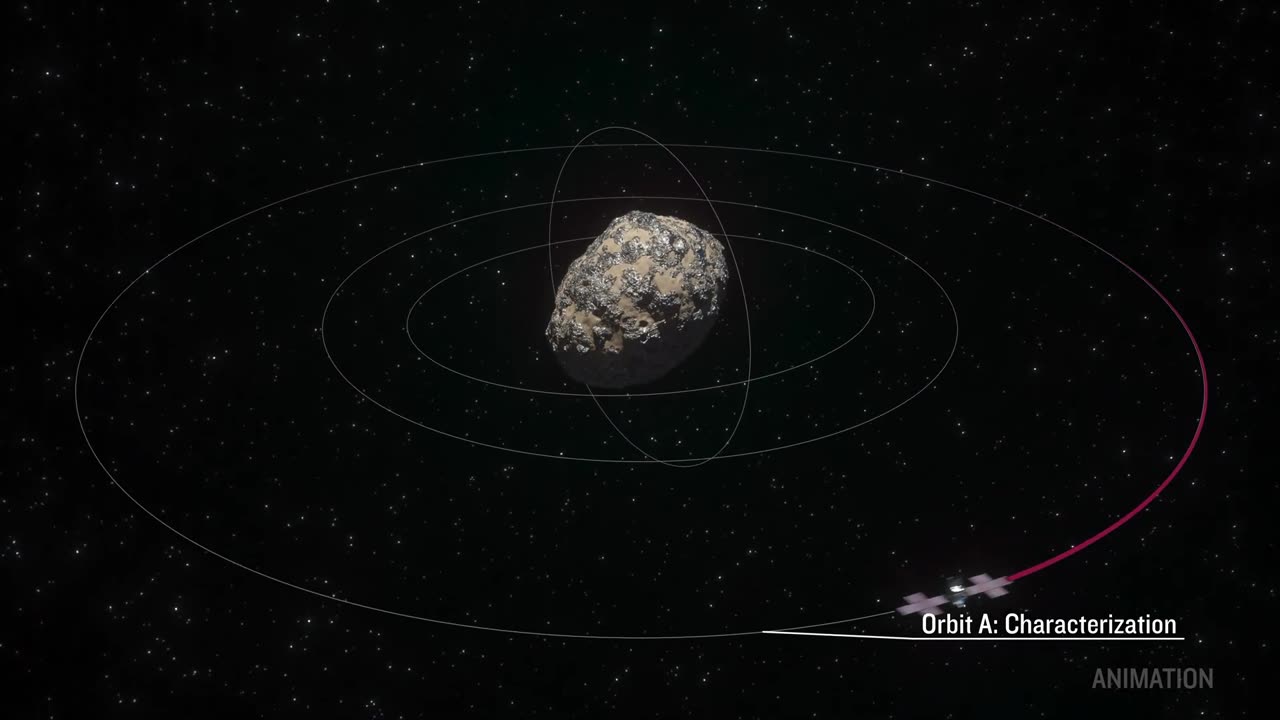Premium Only Content

How Will #MissionToPsyche Use Gravity to Study An Asteroid?
#gravity #astroid #studyasteroid #targetasteroid #missionpsyche #psyche #mars #moon #space #rocketlaunch #spaceexploration #marsexploration# nasamission #nasaspacemission #spacemission #astrology #spaceimaging #spacetechnology #spacescience #moonexploration #jupiter #stakleytingo #wolfchamp #lunar #lunarexploration #spacecraft #spacrocket #spaceshuttel
How Will #MissionToPsyche Use Gravity to Study An Asteroid?
NASA’s Psyche mission will use gravity to study the interior structure of its asteroid target, also named Psyche.
By measuring subtle changes in the X-band radio waves bouncing back and forth between the spacecraft and Earth, the team can precisely determine the asteroid’s mass, gravity field, rotation, orientation, and wobble. These measurements will help scientists learn more about how Psyche, as well as other bodies in our solar system, formed. The gravity science investigation team is led by Maria Zuber of MIT.
The Psyche mission is the first to a metal-rich asteroid. It is expected to launch in October 2023. The spacecraft will begin orbiting the asteroid Psyche in 2029.
Learn about this first-of-its-kind mission at: https://www.nasa.gov/psyche.
Credit: NASA/JPL-Caltech/ASU
Produced by: True Story Films
How Will #MissionToPsyche Use Gravity to Study An Asteroid?
NASA’s Psyche mission will use gravity to study the interior structure of its asteroid target, also named Psyche.
By measuring subtle changes in the X-band radio waves bouncing back and forth between the spacecraft and Earth, the team can precisely determine the asteroid’s mass, gravity field, rotation, orientation, and wobble. These measurements will help scientists learn more about how Psyche, as well as other bodies in our solar system, formed. The gravity science investigation team is led by Maria Zuber of MIT.
The Psyche mission is the first to a metal-rich asteroid. It is expected to launch in October 2023. The spacecraft will begin orbiting the asteroid Psyche in 2029.
Learn about this first-of-its-kind mission at: https://www.nasa.gov/psyche.
Credit: NASA/JPL-Caltech/ASU
Produced by: True Story Films
How Will #MissionToPsyche Use Gravity to Study An Asteroid?
NASA’s Psyche mission will use gravity to study the interior structure of its asteroid target, also named Psyche.
By measuring subtle changes in the X-band radio waves bouncing back and forth between the spacecraft and Earth, the team can precisely determine the asteroid’s mass, gravity field, rotation, orientation, and wobble. These measurements will help scientists learn more about how Psyche, as well as other bodies in our solar system, formed. The gravity science investigation team is led by Maria Zuber of MIT.
The Psyche mission is the first to a metal-rich asteroid. It is expected to launch in October 2023. The spacecraft will begin orbiting the asteroid Psyche in 2029.
Learn about this first-of-its-kind mission at: https://www.nasa.gov/psyche.
Credit: NASA/JPL-Caltech/ASU
Produced by: True Story Films
How Will #MissionToPsyche Use Gravity to Study An Asteroid?
NASA’s Psyche mission will use gravity to study the interior structure of its asteroid target, also named Psyche.
By measuring subtle changes in the X-band radio waves bouncing back and forth between the spacecraft and Earth, the team can precisely determine the asteroid’s mass, gravity field, rotation, orientation, and wobble. These measurements will help scientists learn more about how Psyche, as well as other bodies in our solar system, formed. The gravity science investigation team is led by Maria Zuber of MIT.
The Psyche mission is the first to a metal-rich asteroid. It is expected to launch in October 2023. The spacecraft will begin orbiting the asteroid Psyche in 2029.
Learn about this first-of-its-kind mission at: https://www.nasa.gov/psyche.
Credit: NASA/JPL-Caltech/ASU
Produced by: True Story Films
How Will #MissionToPsyche Use Gravity to Study An Asteroid?
NASA’s Psyche mission will use gravity to study the interior structure of its asteroid target, also named Psyche.
By measuring subtle changes in the X-band radio waves bouncing back and forth between the spacecraft and Earth, the team can precisely determine the asteroid’s mass, gravity field, rotation, orientation, and wobble. These measurements will help scientists learn more about how Psyche, as well as other bodies in our solar system, formed. The gravity science investigation team is led by Maria Zuber of MIT.
The Psyche mission is the first to a metal-rich asteroid. It is expected to launch in October 2023. The spacecraft will begin orbiting the asteroid Psyche in 2029.
Learn about this first-of-its-kind mission at: https://www.nasa.gov/psyche.
Credit: NASA/JPL-Caltech/ASU
Produced by: True Story Films
How Will #MissionToPsyche Use Gravity to Study An Asteroid?
NASA’s Psyche mission will use gravity to study the interior structure of its asteroid target, also named Psyche.
By measuring subtle changes in the X-band radio waves bouncing back and forth between the spacecraft and Earth, the team can precisely determine the asteroid’s mass, gravity field, rotation, orientation, and wobble. These measurements will help scientists learn more about how Psyche, as well as other bodies in our solar system, formed. The gravity science investigation team is led by Maria Zuber of MIT.
The Psyche mission is the first to a metal-rich asteroid. It is expected to launch in October 2023. The spacecraft will begin orbiting the asteroid Psyche in 2029.
Learn about this first-of-its-kind mission at: https://www.nasa.gov/psyche.
Credit: NASA/JPL-Caltech/ASU
Produced by: True Story Films
How Will #MissionToPsyche Use Gravity to Study An Asteroid?
NASA’s Psyche mission will use gravity to study the interior structure of its asteroid target, also named Psyche.
By measuring subtle changes in the X-band radio waves bouncing back and forth between the spacecraft and Earth, the team can precisely determine the asteroid’s mass, gravity field, rotation, orientation, and wobble. These measurements will help scientists learn more about how Psyche, as well as other bodies in our solar system, formed. The gravity science investigation team is led by Maria Zuber of MIT.
The Psyche mission is the first to a metal-rich asteroid. It is expected to launch in October 2023. The spacecraft will begin orbiting the asteroid Psyche in 2029.
Learn about this first-of-its-kind mission at: https://www.nasa.gov/psyche.
Credit: NASA/JPL-Caltech/ASU
Produced by: True Story Films
How Will #MissionToPsyche Use Gravity to Study An Asteroid?
NASA’s Psyche mission will use gravity to study the interior structure of its asteroid target, also named Psyche.
By measuring subtle changes in the X-band radio waves bouncing back and forth between the spacecraft and Earth, the team can precisely determine the asteroid’s mass, gravity field, rotation, orientation, and wobble. These measurements will help scientists learn more about how Psyche, as well as other bodies in our solar system, formed. The gravity science investigation team is led by Maria Zuber of MIT.
The Psyche mission is the first to a metal-rich asteroid. It is expected to launch in October 2023. The spacecraft will begin orbiting the asteroid Psyche in 2029.
Learn about this first-of-its-kind mission at: https://www.nasa.gov/psyche.
Credit: NASA/JPL-Caltech/ASU
Produced by: True Story Films
-
 27:00
27:00
Squaring The Circle, A Randall Carlson Podcast
17 hours agoSPECIAL EPISODE: #037 Randall Carlson Explains The Vital Role of Sacred Geometry in the Modern Age
1.21K2 -
 58:35
58:35
Trumpet Daily
19 hours ago $3.71 earnedThe Trade War Begins - Trumpet Daily | Feb. 3, 2025
3.11K18 -
 47:03
47:03
Uncommon Sense In Current Times
17 hours agoArrested For Praying Silently in Western Culture and Convicted
2.05K -
 44:19
44:19
PMG
15 hours ago $0.01 earnedIn the wake of a tragedy! Finding hope in broken times
2.52K -
 3:40:50
3:40:50
FreshandFit
9 hours agoGirls Get Exposed As THOTS After Demanding Millionaires?!
102K106 -
 5:30:06
5:30:06
SpartakusLIVE
13 hours ago#1 King of Content kicks off YOUR week with Monday MOTIVATION
110K8 -
 5:56:52
5:56:52
Akademiks
11 hours agoKendrick Lamar Sweeps Grammys. Drake announces new album on Feb 14. Rocky Trial Might get Dismissed?
89.2K6 -
 3:25:02
3:25:02
BrancoFXDC
9 hours ago $2.74 earnedWarzone Rebirth Rounds
37.9K -
 1:44:14
1:44:14
Glenn Greenwald
15 hours agoRubio's Shift: What is Trump's Foreign Policy? Trump/Musk Attack CIA Fronts USAID & NED: With Mike Benz | SYSTEM UPDATE #401
101K102 -
 1:05:47
1:05:47
Donald Trump Jr.
17 hours agoMexico Sends Troops to Border, Plus USAid Scam Exposed, Live with Brooke Goldstein & Rep Brian Mast | TRIGGERED Ep.213
253K317